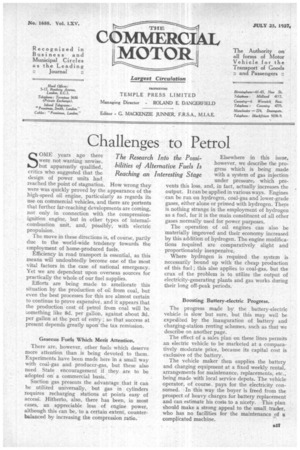Challenges to Petrol
Page 31

If you've noticed an error in this article please click here to report it so we can fix it.
SOME years ago there were not wanting unwise, but apparently qualified, critics who suggested that the design of power units had reached the point of stagnation. How wrong they were was quickly proved by the appearance of the high-speed oil engine, particularly as regards its use on commercial vehicles, and there are portents that further far-reaching developments are coming, not only in connection with the compressionignition engine, but in other types of internalcombustion unit, and, possibly, with electric propulsion.
The move in these directions is, of course, partly due to the world-wide tendency towards the employment of home-produced fuels.
Efficiency in road transport is essential, as this means will undoubtedly become one of the most vital factors in the case of national emergency. Yet we are dependent upon overseas sources for practically the whole of our fuel supplies.
Efforts are being made toameliorate this situation by the production of oil from coal, but even the best processes for this are almost certain to continue to prove expensive, and it appears that the production cost of petrol from coal will be something like 8d. per gallon, against about 3d: per gallon at the port of entry ; so that success at present depends greatly upon-the tax remission.
Gaseous Fuels Which Merit Attention.
There are, however, other fuels which deserve more attention than is being devoted to them. Experiments have been made here in a small way with coal-gas and producer-gas, but these also need State encouragement if they are to be adopted on a commercial basis.
Suction gas presents the advantage that it can be utilized universally, but gas in cylinders requires recharging stations at points easy of access. Hitherto, also, there has been, in most cases, an appreciable loss of engine power, although this can be, to a certain extent, counterbalanced by increasing the compression ratio. Elsewhere in this issue, however, we describe the progress which is being made with a system of gas injection under pressure, which prevents this loss, and, in fact, actually increases the output. It can be applied in various ways. Engines can be run on hydrogen, coal-gas and lower-grade gases, either alone or primed with hydrogen. There is nothing strange in the employment of hydrogen as a fuel, for it is the main constituent of all other gases normally used for power purposes.
The operation of oil engines can also be materially improved and their economy increased by this addition of hydrogen. The engine modifications required are comparatively slight and proportionately inexpensive.
Where hydrogen is required the system is necessarily bound up with the cheap production of this fuel ; this also applies to coal-gas, but the crux of the problem is to utilize the output of electricity-generating plants and gas works during their long off-peak periods.
Boosting Battery-electric Progress.
The progress made by the battery-electric vehicle is slow but sure, but this may well be expedited by the inauguration of battery and charging-station renting schemes, such as that we describe on another page.
The effect of a sales plan on these lines permits an electric vehicle to be marketed at a comparatively moderate price, because its capital cost is exclusive of the battery.
The vehicle maker then supplies the battery and charging equipment at a fixed weekly rental, arrangements for maintenance, replacements, etc., being' made with local service depots. The vehicle operator, of course, pays for the electricity consumed. In this way the buyer is freed from the prospect of heavy charges for battery replacement and can estimate his costs to a nicety. This plan should make a strong appeal to the small trader, who has no facilities for the maintenance of a complicated machine.




























































































